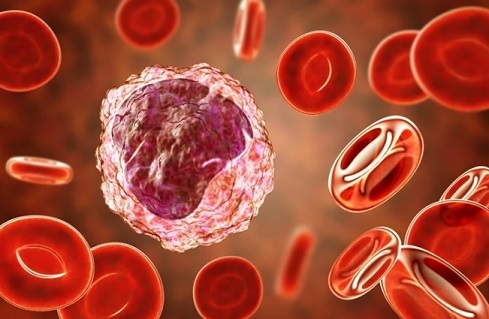COVID-19 Makes Monocytes Dysfunctional Post-Infection Raising Risk of Opportunistic Infections or Pathogen Reactivation
Nikhil Prasad Fact checked by:Thailand Medical News Team Feb 08, 2025 2 months, 5 days, 9 hours, 46 minutes ago
Medical News: Long-Term Impact of COVID-19 on the Immune System
A new study conducted by researchers from the University of Brighton and Brighton and Sussex Medical School has revealed that COVID-19 can leave long-lasting effects on the immune system, particularly by altering the function of monocytes - key cells responsible for responding to infections. This means that even months after recovering from COVID-19, individuals may remain vulnerable to opportunistic infections or reactivation of latent pathogens in their bodies.
 COVID-19 Makes Monocytes Dysfunctional Post-Infection Raising Risk of Opportunistic
COVID-19 Makes Monocytes Dysfunctional Post-Infection Raising Risk of Opportunistic
Infections or Pathogen Reactivation
The Persistence of Immune Dysregulation
According to the study, SARS-CoV-2 infection triggers prolonged immune changes that persist for three to six months post-infection. The research focused on monocytes, a type of white blood cell that plays a crucial role in detecting and responding to pathogens. The researchers found that these immune cells exhibited a reduced response to key immune-stimulating receptors known as toll-like receptors (TLR) and retinoic acid-inducible gene I (RIG-I). This
Medical News report highlights that such dysfunctions can leave individuals with a weakened first line of defense against secondary infections.
Monocytes from individuals who had recovered from mild and severe COVID-19 displayed a decrease in their ability to respond to TLR2, TLR4, and RIG-I activation, which are essential pathways for detecting viruses and bacteria. This reduced immune responsiveness suggests that the immune system does not fully reset to its normal function after the infection, making individuals more susceptible to reinfections or opportunistic infections.
Study Design and Findings
The study was conducted on blood samples from individuals who had COVID-19 during the first wave of the pandemic. Researchers analyzed their monocytes’ gene expression and responsiveness to immune stimulants. The results showed:
-Sustained Gene Expression Changes: The monocytes exhibited alterations in genes responsible for innate immune responses. These changes persisted months after recovery, indicating a long-term immune reprogramming effect.
-Weakened Response to Pathogens: Monocytes from COVID-19-recovered individuals had a muted response when exposed to immune system activators like bacterial and viral components.
-Increased Negative Regulation of Immune Signals: The expression of genes such as SOCS3 and SIGIRR, which are involved in dampening immune responses, was elevated in post-COVID-19 monocytes. This could explain why the immune system remains suppressed long after the infection has cleared.
Possible Mechanisms Behind Monocyte Dysfunction
The researchers believe that the immune alterations seen in COVID-19-recovered individuals may ste
m from a phenomenon called trained immunity, where immune cells undergo long-term genetic and metabolic changes after an infection. While this can sometimes lead to a heightened immune response, in the case of COVID-19, it appears to result in immune tolerance - a state in which monocytes become less reactive to subsequent infections.
Additionally, increased levels of immune-dampening proteins such as SOCS3 and SIGIRR suggest that the immune system may be actively suppressing inflammatory responses, possibly as a protective mechanism against excessive immune activation. However, this suppression could also leave individuals vulnerable to new infections.
The Role of Monocyte Reprogramming in Long COVID
These findings contribute to the growing evidence that SARS-CoV-2 infection causes persistent immune alterations, which may be linked to long COVID. Long COVID patients often report lingering symptoms such as fatigue, brain fog, and muscle pain, which could be partially explained by an impaired immune response. If monocytes remain dysfunctional, it could lead to prolonged inflammation or an inability to effectively clear infections, exacerbating long-term symptoms.
Implications for Post-COVID-19 Health Risks
The weakened immune response observed in convalescent COVID-19 patients suggests an increased risk of infections. Several opportunistic infections, including bacterial and viral diseases, could become more prevalent in these individuals. One notable example is Epstein-Barr virus (EBV) reactivation, which has been reported in COVID-19 survivors.
Additionally, individuals recovering from COVID-19 have been found to be more susceptible to conditions such as streptococcal infections, respiratory tract infections, and other viral reactivations. This immune suppression could also impact how well they respond to vaccinations, as previously infected individuals have been shown to have reduced responses to booster shots of COVID-19 vaccines.
Broader Health Concerns and Future Research Directions
Given these findings, there is a need for further research to determine how long these immune alterations persist and whether they increase susceptibility to other diseases in the long term. Some key questions that remain unanswered include:
-Do these monocyte dysfunctions persist beyond six months post-infection?
-Can therapeutic interventions restore normal monocyte function?
-What are the broader implications for individuals with pre-existing conditions?
The study underscores the importance of continued monitoring of COVID-19 survivors, particularly those who experienced severe illness, to ensure that lingering immune dysfunctions do not lead to future health complications.
Conclusion
This research highlights a crucial but often overlooked aspect of post-COVID-19 recovery: the lingering impact on immune function. The discovery that monocytes remain dysfunctional for months after infection suggests that recovered individuals may not be as immune to infections as previously assumed. These findings reinforce the importance of continued vigilance, even after an individual has recovered from COVID-19, and call for more research into therapeutic strategies to restore immune function in affected individuals.
The study findings were published in the peer-reviewed journal: Human Immunology.
https://www.sciencedirect.com/science/article/pii/S0198885925000205
For the latest COVID-19 News, keep on logging to Thailand
Medical News.
Read Also:
https://www.thailandmedical.news/news/university-of-manchester-study-reveals-sustained-monocyte-dysfunction-as-a-key-feature-of-acute-covid-19-infections-and-long-covid
https://www.thailandmedical.news/news/covid-19-news-imperial-college-london-study-shows-that-sars-cov-2-causes-monocytes-from-the-innate-immune-system-to-become-dysfunctional
https://www.thailandmedical.news/news/international-study-finds-that-sars-cov-2-causes-epigenetic-changes-and-transcriptomic-reprogramming-in-monocytes-of-covid-19-patients
https://www.thailandmedical.news/news/university-of-virginia-study-finds-that-sars-cov-2-infections-triggers-reduction-in-circulating-monocytes-that-leads-to-persistent-post-covid-pulmonar
https://www.thailandmedical.news/news/post-covid-fatigue-associated-with-increased-expression-of-inflammatory-genes-in-monocytes,-serum-pro-inflammatory-cytokines-and-increased-cd8-t-cells
https://www.thailandmedical.news/news/even-mild-and-moderate-sars-cov-2-infections-causes-transcriptional-reprogramming-of-the-host-s-cd14-monocytes-resulting-in-dysfunctional-monocytes
https://www.thailandmedical.news/news/breaking-ongoing-u-s-study-shows-persistence-of-sars-cov-2-s1-protein-in-cd16-monocytes-in-post-acute-sequelae-of-covid-19-up-to-15-months-post-infe
https://www.thailandmedical.news/news/yet-another-alarming-research-finding-persistence-of-sars-cov-2-s1-protein-found-in-cd16-monocytes-of-post-covid-19-patients-up-to-15-months-after-so-
https://www.thailandmedical.news/news/harvard-led-study-confirms-that-sars-cov-2-coronavirus-infects-blood-monocytes-which-in-turn-triggers-inflammation
https://www.thailandmedical.news/news/breaking-covid-19-latest-sars-cov-2-induces-immunoparalysis-of-human-host,-infects-monocytes,-macrophages-and-can-cause-fibrosis-in-post-covid-19
https://www.thailandmedical.news/news/u-s-study-finds-that-monocyte-anisocytosis-corresponds-with-increasing-severity-of-covid-19-in-children
https://www.thailandmedical.news/news/deciphering-the-mysteries-of-post-covid-immunity-unique-molecular-signatures-in-monocytes-and-regulatory-t-cells
https://www.thailandmedical.news/news/sars-cov-2-causes-deficient-phagocytosis-in-circulating-monocytes,-paving-the-way-for-opportunistic-fungal-infections-including-mucormycosis
https://www.thailandmedical.news/news/covid-19-news-german-study-shows-that-monocyte-derived-macrophages-in-sars-cov-2-infection-causes-vascular-and-lung-damage-in-hamsters-
https://www.thailandmedical.news/news/covid-19-news-sars-cov-2-e-protein-induces-inflammatory-response-and-monocyte-pyroptosis-which-can-be-reversed-by-ruscogenin
https://www.thailandmedical.news/news/cd147-and-cyclophilin-enables-sars-cov-2-infection-of-human-monocytes-and-activation-of-toll-like-receptors
https://www.thailandmedical.news/news/covid-19-vaccines-causes-persistence-of-spike-protein-in-the-cd16-monocytes-and-makes-sars-cov-2-negative-people-sick-with-pasc-like-sickness
https://www.thailandmedical.news/news/convalescent-covid-19-patients-found-to-have-reduced-monocyte-proportions-and-monocytes-that-were-hyporesponsive-evidence-of-immune-dysregulation
https://www.thailandmedical.news/news/breaking-medical-news-methoxy-mycolic-acid-from-bcg-shows-promise-in-relieving-monocyte-exhaustion-and-promoting-t-cell-proliferation
https://www.thailandmedical.news/news/covid-19-news-german-study-discovers-ace2-independent-sars-cov-2-virus-entry-through-cell-surface-grp78-on-monocytes
